She graduated from University of Salamanca (Spain) with BSc Biology to later complete her master’s in Clinic and Biology of Cancer at the Centro de Investigacion del Cancer (Salamanca). She obtained her PhD in Molecular Medicine at the University of Salamanca and moved to London to carry out her postdoctoral studies on prostate cancer genetics at the Institute of Cancer Research (ICR, London). During her time there, Clara specialised in the functional validation of novel genes and variants in prostate cancer and novel technologies.
In 2019, Clara moved to St George's where she started to get involved in the St George's Genomic Medicine course, and in 2021 became the Course Director of the Genomic Medicine MSc.
Clara is also involved in public engagement, especially addressed to children and youth groups as part of her UK STEM Ambassador role.
Talk to Clara about: Genomic medicine, Cancer genetics, 3D Cell culture models, Targeted therapies, Liquid biopsies, Genome editing, and public engagement.
He is the deputy course director of MSc Genomic Medicine, as well as its admissions tutor. He is a module lead on the Clinical Neuroscience and Genomics of Neurological Disorders modules, and supervises research project students in Biomedical Sciences.
View all
Close all
Dr Amanda Fitzpatrick - Omics Module
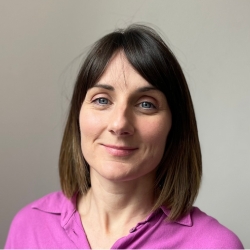
Clinical Senior Lecturer in Experimental Medicine at King’s College London
Dr Amanda Fitzpatrick MBChB is Clinical Senior Lecturer in Experimental Medicine at King's College London, and an Honorary Medical Oncologist at Guys and St Thomas’ Hospital. She completed a PhD at the Institute of Cancer Research (ICR) in 2019 investigating the genomics and biology of breast cancer leptomeningeal disease, funded by an MRC Clinical Research Training Fellowship. Her current research activities focus on central nervous system metastasis from solid tumours, with a particular focus on liquid biopsy, tumour evolution and disease modelling.
Dr Anna Pacholczyk - Ethics Module

Senior Lecturer in Medical Ethics at St George’s, University of London
Dr Anna Pacholczyk is a Senior Lecturer in Medical Ethics at St George’s, University of London. She specializes in philosophical bioethics and neuroethics. Her main field of interest is ethics of new technologies in medicine (such as genetic technologies, stem cell therapies and neuro-technologies). Among other topics, she is interested in the ethics of AI, deep brain stimulation, enhancement, and ethical issues surrounding the use and development of human brain organoids. She serves as a lead for Medical Ethics and Law for the medical programme, and leads undergraduate and postgraduate teaching in ethics and medicine, including being a module co-lead for postgraduate Genomic Medicine module entitled Ethical, Legal and Social perspectives on Genomic Medicine.
Anna studied cognitive science (BPS Accredited), and after some placement work with patients with dementia, she decided to further study healthcare ethics and law at postgraduate level. After obtaining her MA and PhD from the Manchester School of Law with the focus in healthcare ethics and bioethics, she worked at the University of Bristol, as well as KCL before moving to a lectureship position at City St George’s, University of London where she currently is a Senior Lecturer in Medical Ethics.
Dr Graeme Hewitt - Pathology of Cancer Module
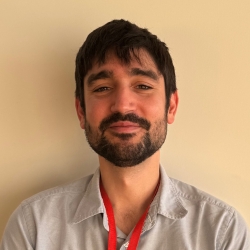
Leader of the Genome Stability Lab at King’s College London
Dr Graeme Hewitt is the leader of the Genome stability lab King’s College London. The lab was established with a CRUK CoL Radnet fellowship and is interested in understanding cellular mechanisms of DNA damage repair and how these can be targeted to treat cancer. The genome stability group utilise functional genomics to pick apart the molecular mechanisms of different DNA repair pathways and the interplay between them. Currently the lab is focused on understanding vulnerabilities and resistance mechanisms in response to different modalities of radiotherapy. Graeme has expertise in DNA damage repair, telomere biology, ageing and cancer and methodologies such as whole genome CRISPR screening and live cell imaging. Graeme is a deputy module lead for the molecular pathology of cancer module on the Genomic Medicine Master’s.
Prof Guy Tear - Fundamentals Module and Research Project

Professor of Molecular Neurobiology at King’s College London
Guy Tear is Professor of Molecular Neurobiology at King’s College London. He is a geneticist that uses Drosophila as a model organism to understand genetic mechanisms that control establishment of neural circuitry and to gain insights into the normal and pathological function of proteins that contribute to neurodegenerative disease.
Prof Tear has held several educational management positions including Head of Biochemistry (2007-2014 and 2022-2024) and Head of Genetics (2015-2022). Prof Tear delivers teaching at all educational levels across fifteen modules, he is KCL module lead for the Research Project modules. His teaching skills are recognised annually by nomination for awards and by his award of a King’s College Education Award in 2022 for Expanding Opportunities.
He completed his PhD in the Genetics Department at Cambridge University investigating the genetic control of early development of the embryo. He was awarded an EMBO Long Term Fellowship to complete postdoctoral research at the University of California, Berkeley. Prof Tear returned to the United Kingdom in 1996 as a MRC Senior Research Fellow at Imperial College, London before moving to the Centre for Developmental Neurobiology at King’s College, London as Senior Lecturer in 2000. He was promoted to Professor of Molecular Neurobiology in 2004.
Harriet McMillan - Counselling Module
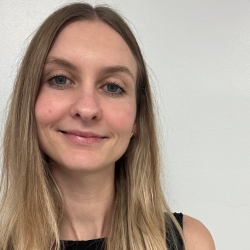
Principal Genetic Counsellor in the South West Thames Centre for Genomics
Harriet McMillan is a Principal Genetic Counsellor in the South West Thames Centre for Genomics, based at St George’s University Hospitals NHS Foundation Trust. Harriet is part of the rare disease and prenatal team and has a specialist interest in Neurogenetics. Harriet studied Biology (BSc) at the University of Nottingham. She completed the 2 year MSc in Genetic Counselling at the University of Manchester with Distinction in 2017. In 2020 Harriet became a registered member of the Genetic Counsellor Registration Board (GCRB). The GCRB register has since been transferred to the Academy for Healthcare Science (AHCS). Harriet spent 5 years working as a Genetic Counsellor in the Manchester Centre for Genomic Medicine before joining the team based at St George’s in 2022.
Prof Jordana Bell - Rare and Common Inherited Diseases Module

Professor in Epigenomics at King's College London
Jordana Bell is a Professor in Epigenomics at King’s College London, UK. Her research explores the genomic basis of complex traits in human populations, focusing on epigenomic variation. Jordana’s primary research focus is to understand the processes that shape epigenetic variation in human populations, and its biomedical significance to human ageing and age-related cardio-metabolic disease.
Jordana completed her doctoral studies on genetic interactions in complex traits at the University of Oxford. She was subsequently a Wellcome Trust funded fellow at the Universities of Chicago and Oxford, where her work shifted to epigenomics. Since joining King’s in 2012 Jordana has established a research program in human population epigenomics, focusing on twins, and is currently leading research efforts across UK-based and international cohorts and collaborative consortia. More broadly, her research explores how computation genomics and multi-omics can be applied to help characterize human disease pathophysiology and lead towards stratified treatments.
Dr Kate Everett - Fundamentals Module
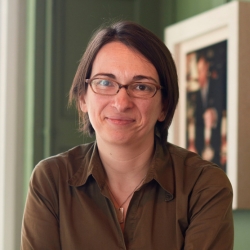
Reader in Human Genetics at St George’s, University of London
Dr Kate Everett read Biology at the University of York before moving to Cambridge University to pursue an MPhil in Biological Anthropology. After a year working in industry, she started her PhD at Cambridge University, funded by Cancer Research UK. The aim of this work was to elucidate the genetic basis of cutaneous malignant melanoma by using melanocytic naevi as a proxy risk measure. This was followed by a move to UCL where she stayed for 7 years before moving to St George's in 2010. Dr Everett's research now focuses primarily on neurogenetics, with an emphasis on identifying the genetic cause of neurodevelopmental disorders.
Since joining St George's in 2010, she has established research links with the clinical genetics team at St George's University Hospital NHS Trust. Her education portfolio spans many undergraduate and postgraduate courses at St George's. She has been involved in the MSc Genomic Medicine since it's inception in 2015 and is currently Deputy head of the Graduate School with oversight of all taught postgraduate programmes at the Tooting campus.
Dr Marta Futema - Cardiovascular Module

Lecturer in Cardiovascular Science at St George’s, University of London
Dr Marta Futema is Lecturer in Cardiovascular Science at the Cardiology Research Centre at St George’s, University of London. Her research overarches genetics, bioinformatics and functional genomics approaches to understand causes of inherited cardiovascular diseases. She has a strong focus on genetic aetiology of Familial Hypercholesterolaemia (FH), from rare variants to polygenic risk scores. Her work has had an impact on the UK clinical guidelines on FH, the NICE Guidelines.
Dr Futema qualified in Medical Biotechnology from University of East London, followed by PhD in Cardiovascular Genetics from UCL Genetics Institute, University College London. She held two postdoctoral positions at UCL before taking up the independent research post at St George’s, in 2021. She remains as an honorary Senior Research Fellow at UCL.
Dr Futema holds a Fellowship of Advance HE and contributes to postgraduate teaching at City St George’s, UCL and Queen Mary University of London, which includes supervision of PhD students. She is the module leader for Cardiovascular Genetics and Genomics (MSc Genomic Medicine (SGUL-KCL)).
Dr Mohammad Mahdi Karimi - Bioinformatics, Advanced Bioinformatics and Pathology of Cancer Modules
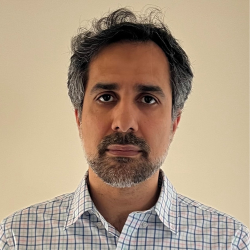
Senior Lecturer in Bioinformatics at King’s College London
Dr Mohammad Mahdi Karimi holds a B.Sc. degree in Biomedical Engineering from Tehran Polytechnic (2002), an M.Sc. degree in Biomedical Engineering from University of Tehran (2004), and a PhD degree in Computing Science from Simon Fraser University, Burnaby, Canada (2009). He has since served as an MSFHR Research Associate at the University of British Columbia, a Research Scientist at Canada's Michael Smith Genome Sciences Centre, and the Head of Bioinformatics at MRC London Institute of Medical Science, before joining King's. He is one of the team leaders to develop the Epigenomic Data Coordination Centre for Canada.
His main research interest is to provide visual analytics and machine learning solutions for multi-omics data integration and analysis towards the discovery of diagnostic and therapeutic targets and predictive models for haematological malignancies.
Dr Muriel Holder - Fetal Genomics Module

Consultant Clinical Geneticist at Guy’s and St Thomas’ NHS Foundation Trust and Medway Maritime Hospital
Dr Muriel Holder is a Consultant Clinical Geneticist at Guy’s and St Thomas’ NHS Foundation Trust and Medway Maritime Hospital. She provides private clinical genetics services at the Portland hospital as well as video consultations.
Muriel started working as an NHS consultant in clinical genetics at Guy's hospital in June 2012 and was head of service between 2020 and 2023. She previously trained and worked in clinical genetics at Lille University Hospital in France as a speciality registrar for four years and as a lecturer for six years. She graduated from Cochin university in Paris. She furthered her training at the Necker Hospital in Paris, as well as Great Ormond Street Hospital in London. She speaks French and English fluently. She is the clinical genetics representative at the Scientific Advisory Committee and the Co-chair of the Genomics Standing Committee for the Royal College of Obstetric and Gynaecology.
Muriel has wide clinical and academic experience with a PhD and habilitation to supervise research in Clinical Genetics and has played a crucial role in more than 100 publications over the years. She teaches King’s College London’s students.
She is a Trustee for HF Mencap and has been heavily implicated at JED (a Franco-Belgian Charity) representing the scientific committee’s board for more than 15 years funding research projects in paediatric neurology and ophthalmology.
Her research interests are focused on limb differences, dysmorphology, dermatology and vascular diseases as well as fetal medicine and pre-implantation genetic testing. In light of this, she has set up a multidisciplinary monthly Clinic for patients with congenital limb differences at St Thomas’ Hospital.
Dr Nayana Lahiri - Genomics of Neurological Disorders Module
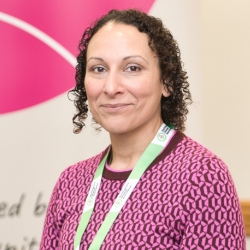
Consultant in Clinical Genetics at the SW Thames Centre for Genomic Medicine
I am a Consultant in Clinical Genetics in the SW Thames Centre for Genomic Medicine based at St George's University Hospital and Honorary Senior Lecturer at St George's, University London.
I specialist in Neurogenetics with particular interests in Huntington's Disease and other adult onset neurodegenerative disease and I am a Trustee for the Huntington's Disease Association as well as on the Executive Board of the European Huntington's Disease Network. I have also developed expertise in the Genomics of Epilepsy and am a visiting Clinical Geneticist to the Epilepsy Genomics Clinic at the ULCH, National Society for Epilepsy.
I work in close collaboration with neurology, neuropsychiatry and other medical professionals and understand some of the challenges in mainstreaming genomics so I am also passionate about multidisciplinary working and improving genomics education to ensure robust diagnoses and clear communication for families affected by genetic disorders.
Dr Panicos Shangaris - Pharmacogenomics and Fetal Genomics Modules
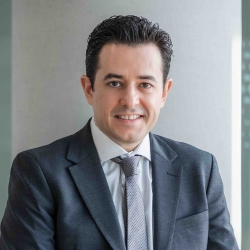
Clinical Senior Lecturer and Consultant in Maternal and Fetal Medicine at King’s College London
Dr Panicos Shangaris graduated from the Royal College of Surgeons in Ireland in 2005 and pursued higher specialist training in London at renowned institutions such as University College London (UCL), the Royal Free London, and North Middlesex Hospitals.
He enrolled in a Master's degree program at University College London (UCL), where he received a distinction in Fetal Medicine and Prenatal Genetics. Opting for deeper academic engagement, he embarked on a PhD at UCL. Under the supervision of Professor Anna David and Professor Paolo De Coppi, Panicos specialised in treating genetic blood disorders via fetal stem cell transplantation and gene therapy. Once he earned his PhD, Panicos took up a position as an NIHR Clinical Lecturer at King's College London (KCL). With a focus on Maternal and Fetal Medicine, he gained clinical experience at institutions such as Guy's and St Thomas' Hospitals and King's College Hospital (KCH).
Panicos currently holds the position of a Clinical Senior Lecturer and Consultant in Maternal and Fetal Medicine at King's College London and King’s College Hospital. His work has significantly advanced the field of prenatal therapy for sickle cell disease and the immunology of pregnancy.
One of his major projects, the Prenatal Therapy for Sickle Cell Disease (PERICLES) project, focuses on developing and assessing gene-editing technologies and delivery methods in human and mouse fetal hematopoietic stem cells. This project aims to provide a therapeutic option that could lead to the birth of disease-free individuals, which is particularly transformative for regions where sickle cell disease is prevalent and treatment options are limited.
In addition to his work on sickle cell disease, Panicos is deeply involved in studying the immunology of pregnancy. His research emphasises the role of regulatory T cells (Tregs) in maintaining a balanced immune environment, which is crucial for successful pregnancy outcomes. This work is part of his commitment to understanding and enhancing maternal and fetal health through innovative prenatal therapies and immunological studies.
Panicos supervises BSc, MSc, and PhD students and leads new initiatives like the Fetal Genomics module in the MSc program in Genomic Medicine. His collaborative efforts with noted researchers such as Professors Kypros Nicolaides, John Strouboulis, and Giovanna Lombardi have enriched his work and contributions to the field.